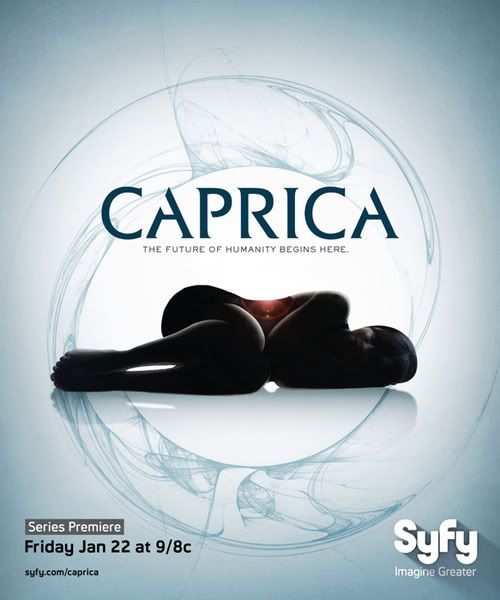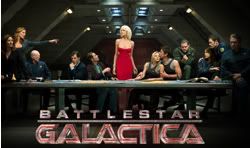
Bear McCreary has updated his blog with an epic post about the epic music he composed for Daybreak:
...I can safely say it is the most ambitious and epic episode that required the grandest, most thematically developed score I have yet written. In this blog, I will show you the path I followed in order to write it.
Perhaps the nearly 100-minute score to Daybreak should be re-titled: The Battlestar Galactica Symphony. With all my thematic material firmly established in previous episodes, I took this opportunity to develop them further than ever before. Themes were combined, fractured, distorted, elongated, inverted and augmented in rewarding ways. This process became so overwhelming, I actually made myself a checklist of every major theme I wanted to appear in the finale and marked them off as I wrote. With very few exceptions, each was woven into the score somewhere along the way.
Even my compositional process was different this time around. Typically, when I approach an episode, I score the most difficult scenes first. However, I knew that approach would never work for Daybreak. I felt such intense creative pressure going into this episode that I was nearly stifled. Once I wrote the big cues at the episode’s conclusion, I’d never have the energy to go back and do the smaller pieces. So, I rolled up my sleeves, began the very first cue in the episode and proceeded straight through in chronological order until I finished the final cue, a blistering and virtually sleepless sixteen days later.
Bear makes this note about the concluding scenes of the finale:
However, in my admittedly biased opinion, the use of Jimi’s “Watchtower” at the end lacks the emotional punch one would expect from the end of the series. Indeed, the entire sequence in Manhattan is more satisfying on an intellectual level than an emotional one. But, I am not suggesting it was inappropriate. The idea of Hera becoming the “Mitochondrial Eve” for modern humanity was central to the entire series. There was simply no other way to communicate this story point without jumping to the modern day.
That is why I thought of Adama’s scene beside Roslin’s grave as the emotional end of the series, and the epilogue in New York as the conceptual end of the series. And I scored them as such. The recapitulation of “The Shape of Things to Come” bursts with emotion, sadness and joy. The following cue, the variation of “One Year Later,” conveys mystery, intrigue and curiosity on an epic scale, but is not overtly sentimental.
Bear also made some announcements for his plans for forthcoming CDs:
As of this writing, my plan is to produce a 2-CD ALBUM. The first disc would cover He That Believeth through Islanded in a Stream of Stars. The second disc would basically just be Daybreak. I’m thinking that cues from Razor and The Plan would be included in an upcoming box-set of unreleased material. I’m not opposed to putting a few choice Razor cuts on the Season 4 album, but honestly, there’s so much incredible music from the other episodes, my gut instinct is to hold on to Razor for a separate release.
I am pleased to announce that La La Land Records will release my soundtrack to Caprica in a few weeks, basically concurrent with the DVD release. I’ll have official details up here on the blog as soon as they become available.
Read the entirety of Bear's essay on Daybreak to get a full feel of his creative process.
I'm going to really miss Bear's weekly exegesis of Battlestar Galactica's incredible music.






3 comments:
I agree. Reading that blog entry was sad, though I love how passionate he is and is willing to share his insights. I hope he goes on to continue to do great things.
In this post, Bear reveals something truly astonishing and wonderful about the music production process. The production was seriously over budget, but Bear needed more money so he could hire an orchestra. So:
"In an unprecedented move, the producers and I each pitched in personally to make this happen. We all pooled our resources together because we knew how important the full orchestra would be to Daybreak. The orchestra you’re hearing in this episode would not be there without the combined contributions and efforts of Ron Moore, David Eick, Jane Espenson, Michael Taylor, Bradley Thompson, David Weddle, Todd Sharp, Paul M. Leonard, myself and several others."
This singular fact instantly melted my heart. I am a (very part time) composer, and I was once in the position of chipping in my own money on a commissioned orchestral work so the group could afford an additional, crucial brass player. It's so important for a composer to have the full palette that the inspiration requires. That RDM and the other producers valued Bear's artistic vision to the point of personally financing what he needed is amazing and wonderful.
And it says a lot about the producers' extraordinary level of commitment to getting this show right. In fact, it's damn near an act of love. I've complained about some aspects of the finale here, but you know what? I am hereby shutting the frak up, and redirecting my energies to understanding the story RDM wanted to tell, on his terms and not mine.
I really like what he's saying about the emotional end of the show, vs. the conceptual end.
And yes Eric, that is incredible isn't it, about the production team funding some of the finale score when it went overbudget. Unheard of.
Post a Comment